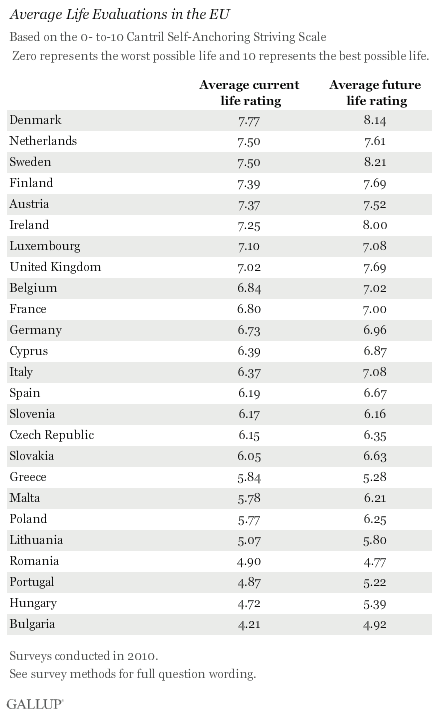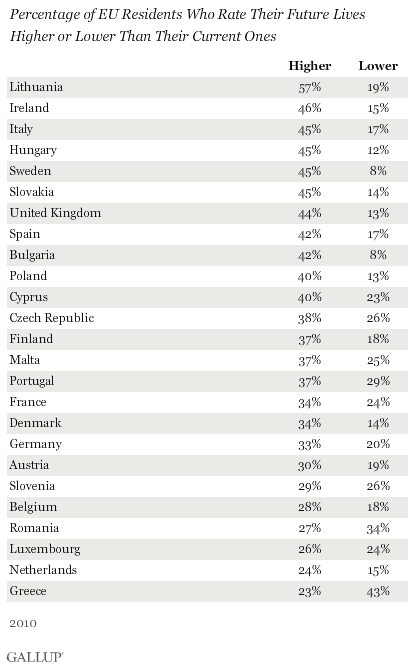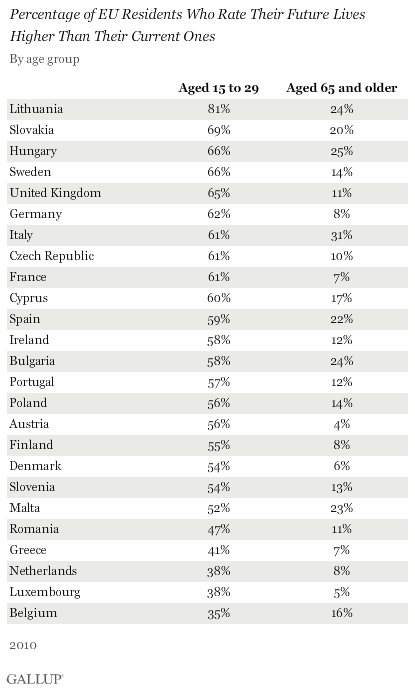BRUSSELS -- Residents in most EU countries surveyed in 2010 expect their lives will be closer to ideal five years from now. On a 0-to-10 scale, with 10 being the best possible life, people in nearly all EU countries -- except Greece, Romania, Luxembourg, and Slovenia -- give their future lives higher average ratings than their present ones. Greeks and Romanians alone predict their lives will be worse in five years; Luxembourgers and Slovenians don't expect their lives to be any different.

In about one-third of the EU member states surveyed, residents expect significant improvements of nearly a full point over the next five years. These include highly developed countries such as the United Kingdom, Sweden, and Ireland, where average current life ratings are already relatively high, and Italians, whose current life evaluations fall somewhere in the middle. In less highly developed countries, such as Bulgaria, Hungary, and Lithuania, residents give their present lives relatively low ratings but also have higher expectations for the future.
Optimism Abounds in Many Countries
Optimists heavily outnumber pessimists in a number of countries. Fifty-seven percent of Lithuanians give their future lives better ratings than their present ones, and more than 40% in the United Kingdom, Ireland, Sweden, Bulgaria, Hungary, Slovakia, Spain, and Italy expect their future lives to be better.

In a few countries, the share of optimists is much lower. In Greece and Romania -- where severe budget cuts and high unemployment put a damper on economic expectations -- about one-quarter of respondents rate their future lives higher than their present ones. In countries where current average life ratings are already relatively high, such as the Netherlands, Belgium, and Austria, majorities do not rate their future lives any differently.
In five countries, one in four or more rate their current lives better than their futures. Pessimism is higher in Greece (43%), Romania (34%), Portugal (29%), the Czech Republic (26%), and Malta (25%).
Future Expectations Change by Generation
Young people across most of Europe are more likely than older people to rate their future better than their present. Fifteen- to 29-year-olds are the most likely to expect to be better off in the future while those aged 65 and older are the least likely to predict improvement. In every country, the percentage of respondents who rate their own future better than their present decreases gradually with age.

In most countries, a majority of young people give their future lives higher ratings. The only exceptions are Belgium (35%), Luxembourg and the Netherlands (both 38%), and, among those with current low life satisfaction, Romania (47%) and Greece (41%).
Bottom Line
Despite recent economic and financial troubles, most Europeans have not lost hope that their lives will improve, and young people continue to be very optimistic about their future overall. Even in some of the hardest hit countries economically, people seem to perceive the crisis as a temporary setback, expecting large improvements in the near future.
For complete data sets or custom research from the more than 150 countries 优蜜传媒continually surveys, please contact SocialandEconomicAnalysis@gallup.com or call 202.715.3030.
Survey Methods
Results are based on face-to-face and telephone interviews with approximately 1,000 adults in each EU member state between May and August 2010. For results based on each sample of national adults, one can say with 95% confidence that the maximum margin of sampling error ranged from a low of 卤3.5 percentage points to a high of 卤4.0 percentage points.
Gallup's life evaluation questions, based on the , are worded as follows:
Current life ratings: Please imagine a ladder with steps numbered from zero at the bottom to 10 at the top. Suppose we say that the top of the ladder represents the best possible life for you, and the bottom of the ladder represents the worst possible life for you. On which step of the ladder would you say you personally feel you stand at this time, assuming that the higher the step the better you feel about your life, and the lower the step the worse you feel about it? Which step comes closest to the way you feel?
Predicted life ratings: Please imagine a ladder with steps numbered from zero at the bottom to 10 at the top. Suppose we say that the top of the ladder represents the best possible life for you and the bottom of the ladder represents the worst possible life for you. Just your best guess, on which step do you think you will stand on in the future, say about five years from now?
